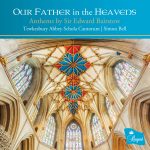TASC Bairstow Triumph!

Warmest congratulations to members Of Tewkesbury Abbey Schola Cantorum, with Simon Bell and Carleton Etherington, on their latest recording being selected as Gramophone Magazine’s Editor’s Choice for July!
Below is the terrific review it received.
Bairstow ‘Our Father in the Heavens’ was released in April and includes lots of favourites, starting with Blessed city, heavenly Salem. Also on this CD: The Blessed Virgin’s Cradle Song. If the Lord had not helped me. Jesu, grant me this I pray. The king of love my shepherd is. The Lamentation. Let all mortal flesh keep silence. Lord, I call upon thee. Lord, thou hast been our refuge. Of the Father’s love begotten. Our Father in the heavens. Save us, O Lord. Though I speak with the tongues of men.
Tewkesbury Abbey Schola Cantorum / Simon Bell with Carleton Etherington org Regent F REGCD543 (72’ • DDD)
With our cathedral, abbey and church choirs so sadly silenced and the future of their cultural inheritance under threat, it is good that Regent Records can remind us of some of this precious glory with an impressive survey of anthems by one of the pivotal figures in early 20th-century British choral music, Edward Cuthbert Bairstow (1874-1946).
A significant Composer
Raised in a strict Methodist family in Huddersfield, a Freemason and master Meccano hobbyist, Bairstow was renowned for his bluntness, especially with amateur choruses. A key figure in the raising of choral standards, particularly in the north of England during his long 33-year tenure at York Minster, he can be considered one of the most significant composers of anthems since SS Wesley. Here are about half of his output of anthems, including two premiere recordings.
The Tewkesbury Abbey Schola Cantorum open a splendid disc with the best-known, Blessed city, heavenly Salem, a series of variations on the plainsong hymn ‘Urbs beata Hierusalem’, given here in a typically impassioned performance. Bairstow’s fondness for variation form also informs Of the Father’s love begotten and Lord, thou hast been our refuge, this latter painted on a large emotional canvas. How one craves the original orchestral accompaniment.
The unaccompanied pieces fare particularly well, especially the disc’s title-track, Our Father in the heavens (1932), and the introit Let all mortal flesh (1906), both of which demand vocal stamina and perfect pitching.
Let’s hear more from TASC!
As with Warlock’s song piano accompaniments, Bairstow’s organ parts are masterpieces in their own right, chock-full of colour and sumptuous quasi-orchestral detail. Carleton Etherington clearly relishes the challenge, totally at one with choir director Simon Bell.
Let us hear more Bairstow from these wonderful executants. It is also high time that his exquisite violin Variations of 1916 (composed for Sibyl Eaton) were commercially recorded. Malcolm Riley

